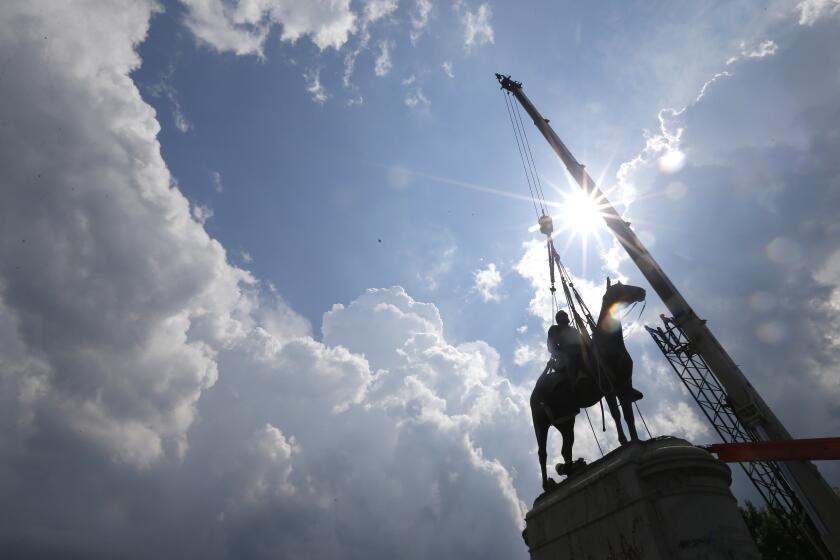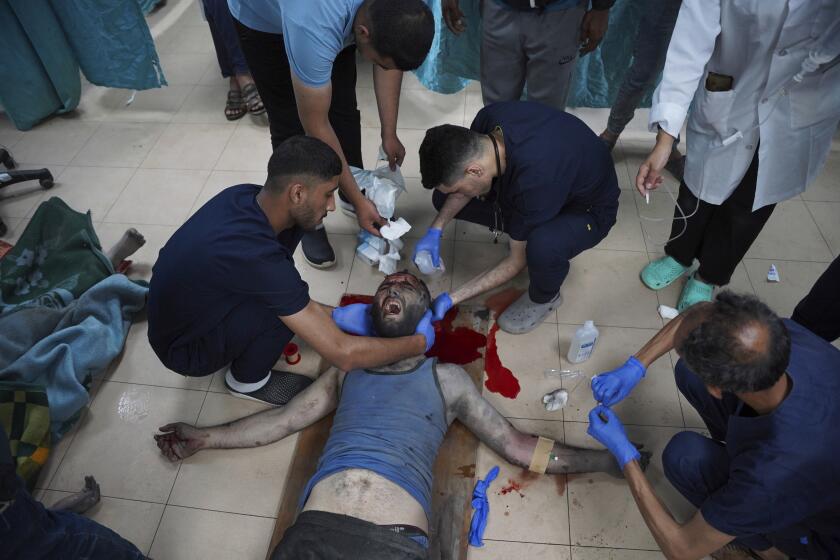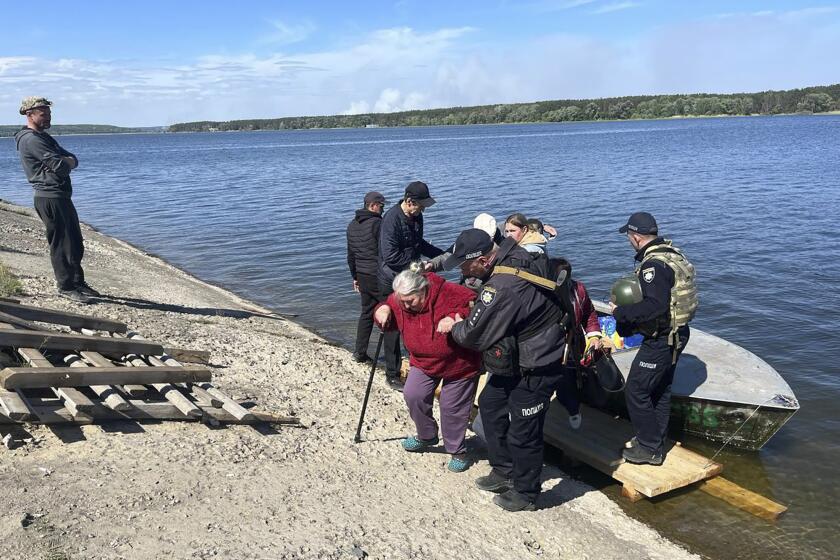7 GIs Die in Crashes and Attacks in Iraq
Two U.S. Army helicopters crashed in Baghdad on Saturday, killing two soldiers, as the military reported that five other American troops had died elsewhere in Iraq. Insurgents also firebombed five Christian churches in the capital, causing damage but no injuries.
Military officials said they were still investigating what caused the helicopters to crash Saturday evening in southwest Baghdad. Two other soldiers were wounded in the crashes.
The other American deaths occurred in two incidents in northern Iraq and one in central Iraq. A suicide car bomber struck a U.S. patrol near the town of Qaim near the Syrian border Friday, killing two soldiers, one Marine and an Iraqi interpreter, the U.S. military reported Saturday.
Another soldier, Spc. Alan J. Burgess, 24, of Landaff, N.H., died of injuries suffered Friday in a car bombing near Mosul, about 220 miles north of the capital. Marine Lance Cpl. Brian K. Schramm, 22, of Rochester, N.Y., was killed in Babil province, south of Baghdad, on Friday.
The names of the others were withheld pending family notification.
In the Sunni Triangle city of Fallouja, west of Baghdad, many residents fled Saturday in anticipation of a U.S. military invasion after negotiations with city leaders broke down a day earlier. U.S. forces yielded control of the rebel focal point in April and haven’t patrolled the city since. On Saturday night, American warplanes launched airstrikes against reported militant strongholds in Fallouja.
Interim Iraqi Prime Minister Iyad Allawi has issued an ultimatum to Falloujans to turn over Jordanian militant Abu Musab Zarqawi, believed to be responsible for a series of car bombings and beheadings in Iraq.
U.S. authorities suspect that Zarqawi is operating openly in the city.
U.S. forces and the Iraqi government are on a sustained military and political push to end parallel Sunni and Shiite rebellions and secure the country before parliamentary elections scheduled for January. In both cases, the political approaches appear to be faltering.
In Baghdad’s Shiite bastion of Sadr City, militants from radical cleric Muqtada Sadr’s Al Mahdi militia continued to turn over weapons as part of a peace agreement to end weeks of violent clashes in the tightly packed slum. But U.S. military officials have said they believed that the vast majority of weaponry remains at large, and the weapons transfer, originally scheduled to end Friday, has been extended through today.
The series of coordinated, early-morning church attacks was the latest strike against the Christian minority in this predominantly Muslim country. In August, 11 people were killed when insurgents bombed five churches in Baghdad and Mosul.
The bombers struck between 4 and 5:45 a.m. In several cases, a small bomb was placed between the outer walls and main church building.
The Roman Catholic church in the central Karada neighborhood sustained the heaviest damage. Windows were shattered, part of a wall was destroyed and doors were knocked off their hinges. Walls were scorched.
St. Jacob’s Church in the southeast Baghdad neighborhood of Dora suffered only minimal damage -- scorch marks were visible on the outer wall, but the stained-glass windows were intact.
Father Saad Sirop of St. Jacob’s said two altar boys who were staying overnight at the church saw a dark Opel station wagon drive up and two people plant the bomb, but they were too frightened to tell anyone. It exploded moments later, but the boys weren’t hurt.
Sirop called on Allawi’s government to improve security for Baghdad’s increasingly besieged Christian community.
“We cannot take security into our own hands -- this is the government’s business,” he said. “This definitely encourages the migration of the Christian community from Iraq.”
The wave of church bombings occurred as fliers were distributed in at least three neighborhoods warning of a violent insurgent campaign. The message, in the name of the Shura Council of the Iraqi Islamic Resistance, advised residents to stay in their homes and came at the beginning of the Muslim holy month of Ramadan.
“The whole area of Iraq will be a zone of fire and a battlefront against the occupier and his allies, using all kinds of weapons,” the flier warned. “This time it is going to be a nonstop battle.”
Father Zeya Yousef of St. George’s Church in Dora praised the response of local residents to the 4:15 a.m. blast.
Muslims and Christians alike rushed to help extinguish the ensuing fire. “Whoever is behind this incident is trying to instigate sedition on a religious level,” he said.
But Yousef predicted they wouldn’t succeed.
“This is nothing compared to the historical suffering [Christians] have had to endure along with all Iraqis,” he said.
The future of the fledgling peace agreement with Sadr, meanwhile, hinges on the extent to which U.S. and Iraqi leaders are satisfied that the Al Mahdi militia has disarmed. So far, the military is expressing frustration with the progress.
Capt. Brian O’Malley, a spokesman for the U.S. Army’s 1st Cavalry Division, said the number of weapons surrendered was just a small fraction of Sadr City’s hidden arsenal. “We still haven’t seen the numbers we were expecting,” he said, particularly for heavy weapons such as rocket-propelled grenades, submachine guns and explosives.
“We need to have thousands and thousands of different kinds of heavy weapons,” he said. “So far, we’ve only broken 1,000 in one category.”
During the first days of the transfer, which started Monday, residents mostly turned in weapons that were “unserviceable and old, basically not the type of weapons that show” the Al Mahdi militia is serious about disarmament, O’Malley said.
On Friday, heavier, newer weapons such as mortar shells and RPGs were turned in -- occasionally by known Mahdi fighters.
“We received two antiaircraft guns in perfect working order,” O’Malley said. “The guys who turned it in said, ‘Yeah, we’ve been shooting at your helicopters.’ ”
The weapons transfer is being run by the Iraqi government, with U.S. troops providing security. But U.S. forces will certainly play a large role in any military push through Sadr City should the final count of weapons turned in be deemed insufficient. Iraqi government and police officials have been meeting nightly with Sadr representatives and making clear their dissatisfaction, O’Malley said.
Sadr spokesman Mahmoud Sudani brushed off U.S. complaints about the hand-over, saying that they come “after five days of receiving weapons from morning to evening. Is it a pretext to launch a new attack and detain our youth after the agreement? I think they are preparing to re-attack the city.”
*
Special correspondent Raheem Salman in Baghdad contributed to this report.
More to Read
Start your day right
Sign up for Essential California for news, features and recommendations from the L.A. Times and beyond in your inbox six days a week.
You may occasionally receive promotional content from the Los Angeles Times.






